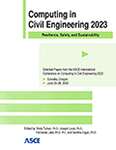The Impact of Affordable Home Features on the Energy Burden in Low-Income Households in the US
Publication: Computing in Civil Engineering 2023
ABSTRACT
Of US households, 44%—about 50 million—are defined as low income. Low-income households (LIH) typically inhabit affordable homes, often the poorest-quality housing units. Compared with other properties, affordable housing is less energy efficient. Because of high affordable housing energy bills, low-income households face a disproportionately high energy burden, that is, the percentage of household income spent on utility costs. Therefore, much more attention is required to develop efficient long-term solutions to reduce the energy burden in low-income households. This study aims to investigate this issue by providing a statistical analysis of how the energy-related characteristics of affordable homes impact the energy burden in low-income households. The 2019 American Housing Survey data has been used in this study to represent the US housing stock. The results show that the average energy burden in low-income households is 11.0%, three times higher than in non-low-income households (3.5%). The results of this study can enhance the awareness of policy-makers, urban planners, and building designers toward designing and creating more energy-equitable decisions.
Get full access to this article
View all available purchase options and get full access to this chapter.
REFERENCES
An, J., D. Yan, and T. Hong. (2018). Clustering and statistical analyses of air-conditioning intensity and use patterns in residential buildings. Energy and Buildings, 174.
Bednar, D. J., T. G. Reames, and G. A. Keoleian. (2017). The intersection of energy and justice: Modeling the spatial, racial/ethnic and socio-economic patterns of urban residential heating consumption and efficiency in Detroit, Michigan. Energy and Buildings, 143.
Bird, S., and D. Hernández. (2012). Policy options for the split incentive: Increasing energy efficiency for low-income renters. Energy Policy, 48.
Dastrup, S., S. McDonnell, and V. Reina. (2012). Household Energy Bills and Subsidized Housing. Cityscape, 14(1): p. 127–147.
EPA. (2009). Building and their Impact on the Environment: A Statistical Summary. [cited 2015 January]; Available from: http://www.epa.gov/greenbuilding/pubs/gbstats.pdf.
Jenkins, K., et al. (2016). Energy justice: A conceptual review. Energy & Social Science, 11.
Kontokosta, C. E., V. J. Reina, and B. Bonczak. (2020). Energy Cost Burdens for Low-Income and Minority Households. Journal of the American Planning Association, 86(1): p. 89–105.
Lowry, I. S. (1960). Filtering and Housing Standards: A Conceptual Analysis. Land Economics, 36(4).
Menassa, C. C. (2011). Evaluating sustainable retrofits in existing buildings under uncertainty. Energy and Buildings, 43(12).
Reames, T. (2016). Targeting energy justice: Exploring spatial, racial/ethnic and socio-economic disparities in urban residential heating energy efficiency. Energy Policy, 97.
Reina, V. J., and C. Kontokosta. (2017). Low hanging fruit? Regulations and energy efficiency in subsidized multifamily housing. Energy Policy, 106.
Rohe, W. M. (2017). Tackling the Housing Affordability Crisis. Housing Policy Debate, 27(3).
Routhier, G. (2019). Beyond Worst Case Needs: Measuring the Breadth and Severity of Housing Insecurity Among Urban Renters. Housing Policy Debate, 29(2).
Scheier, E., and N. Kittner. (2022). A measurement strategy to address disparities across household energy burdens. Nature Communications, 13(1): p. 288.
USCB (US Census Bureau). (2016). American housing survey (AHS). Available at: ⟨https://www.census.gov/programs-surveys/ahs.html⟩ (Apr. 2016).
Information & Authors
Information
Published In
History
Published online: Jan 25, 2024
ASCE Technical Topics:
Authors
Metrics & Citations
Metrics
Citations
Download citation
If you have the appropriate software installed, you can download article citation data to the citation manager of your choice. Simply select your manager software from the list below and click Download.
